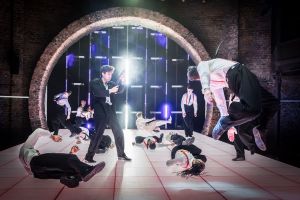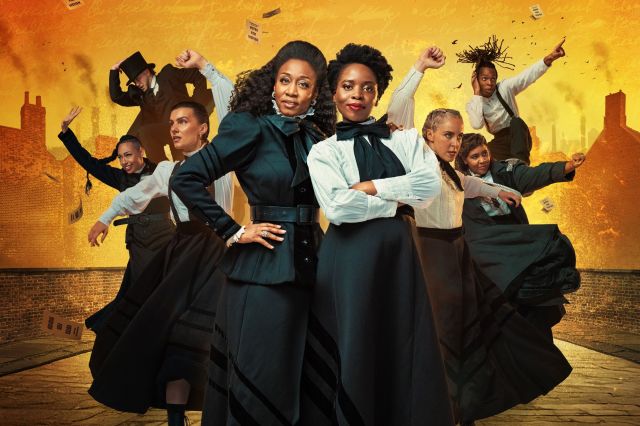The news was as tragic and unexpected as was The Old Woman at the Palace Theatre a few hours later. And I couldn’t help but remember the beautiful appreciation of Bob Wilson’s work Snoo once wrote in a theatre magazine I was editing; unlike most of his contemporaries (he was 64 when he died) on the London fringe of the 1970s and 1980s, he took a keen intellectual interest in Einstein on the Beach and A Letter for Queen Victoria.

With David Hare and Tony Bicat, Snoo founded one of the key touring companies of the early fringe, Portable Theatre, and wrote some literally explosive short plays that mixed violence, horror and farce in much the same sort of way Bob Wilson does – though far more artfully – in The Old Woman, which is a story of hunger, madness and paranoia.
Snoo was as clever as Tom Stoppard and as funny as Alan Bennett, and knew more about most things than any playwright of his generation. He was particularly interested in the occult, and wrote a brilliant play about Aleister Crowley – The Number of the Beast – to prove it.
Despite early distinction, though, he never broke through the ranks to popular approval, even though one of his later plays, HRH, about the Duke and Duchess of Windsor, was eventually produced in the West End. It wasn’t, frankly, all that good, certainly not a patch on the weird and wonderfully extravagant fringe plays about Charles Darwin or biology and mysticism – Soul of the White Ant starring Simon Callow at the old Soho Poly was possibly his masterpiece – that drove critics to distraction and even prompted Bernard Levin to use up his review inventing anagrams of the playwright’s name as he didn’t believe anyone real existed called Snoo.
He did indeed change his name – to Andy Boyle (his first name was Andrew, his mother’s maiden name, Boyle) when writing about other people. But he didn’t maintain the pretence for long, coming out as Snoo and reporting the death of Andy Boyle under a bus. I think he was reviewing a play by Adrian Mitchell set on the top deck of a bus (fellatio was committed on the Number 24), and it might well have been that very same bus that did for Andy.
Both Snoo’s parents were teachers, and he had a distinguished academic career himself, studying with Lorna Sage at the University of East Anglia and teaching literature and theatre at various institutions both here and in America later in life. He was a dramaturg at the RSC in the mid 1970s and editor of the BBC Play for Today series shortly afterwards.
There were countless screenplays, a handful of novels and a new libretto for Offenbach’s Orpheus in the Underworld (designed by Gerald Scarfe) at the ENO. But I don’t think any critic really did him justice, though Ronald Bryden tried his best; and the best of Bryden was always better than anyone else.
Having given up on critics, he decided there was nothing for it but to marry one. He and Ann McFerran, a journalist who was theatre editor of Time Out, were married for over 36 years and had three grown up children. His natural home, though, was the Bush Theatre in the early days, and his colleagues there – Jenny Topper, Simon Stokes, Dusty Hughes, also a former Time Out theatre editor – were his closest friends.
Snoo would have been intrigued by The Old Woman and he certainly would have known Daniil Kharms’s strange Kafkaesque short story about a man who murders an old woman, drinks a bottle of vodka and takes the body in a suitcase on a train to dump it in a bog. Of course, he loses the suitcase. And the story is, appropriately enough, unfinished.
Wilson’s achingly beautiful, brittle production at the Palace Theatre is performed by the great Russian ballet dancer Mikhail Baryshnikov and the film star and Wooster Group stalwart Willem Dafoe. It’s done as a sort of silent movie mime, with silhouettes, cut out scenery, stunning visual effects and lighting, both actors in white face.
The trouble is that it’s impossible to follow the story from the performance, you have to match up bits and pieces of it with your memory of the original (which you should read before seeing it), so the audience’s befuddlement is completely different to how you react normally to absurdism or surrealism in the theatre.
Half way through one scene, for instance, you realise that Dafoe is now the old woman, gabbling away on a Charles Rennie Mackintosh cut-out chair; but is the old woman really in the bright yellow suitcase each actor holds innocently a few minutes later?
This reaction of mine is hopelessly literal and unimaginative. I need Snoo Wilson to deconstruct the imagery for me. But without the Dostoevskyan bleakness and dirtiness in the story, you end up watching a commedia dell’arte that is unevenly projected simply because Baryshnikov is a brilliant physical mime and Dafoe isn’t.
The passing of Snoo will no doubt lead to a revival of interest in his work to add to Chris Hislop’s recent fringe production of More Light at the Rose, Bankside.
This was a timely reminder that while his namesake Bob is a feted superstar on the international festival circuit, Snoo’s wayward and provocative brilliance ensured that his appreciative audiences stayed small and special. In that sense, Snoo was the perfect embodiment of what the fringe was originally meant for: rejecting popular approval, going berserk and baiting the critics.












